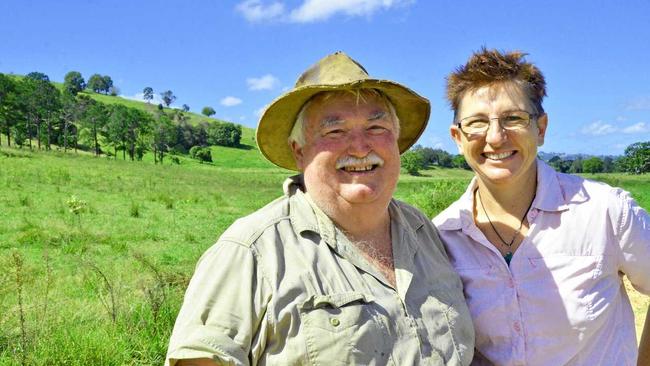Rural Landholder Initiative off and running
LISMORE City Council’s Rural Landholder Initiative has begun.

Lismore
Don't miss out on the headlines from Lismore. Followed categories will be added to My News.
LISMORE City Council's Rural Landholder Initiative has begun, with a tree planting and fencing project kicking off on a Boatharbour cattle farm and the first of 11 landholder field days starting in late March.
The Rural Landholder Initiative has been assisted by a $100,000 grant from the NSW Government through its Environmental Trust, combined with $50,000 from Council's Partnering Fund.
More than 20 landholders were selected last year to become 'champions' for the Rural Landholder Initiative and 11 restoration projects will take place on their properties.
The landholders will help undertake on-ground works and host field days to demonstrate best-practice land management techniques.
Lismore City Council Rural Extension Officer Kate Steel said the champions range from sugar cane croppers, beef graziers and dairy farmers to orchardists and rural lifestyle landholders.
"Having a large variety of landholders enables us to engage people from right across the Local Government Area and invite them to see commercial and hobby farmers protecting biodiversity and improving their properties," Ms Steel said.
"Good land management is so vital to our wildlife and catchment health and in turn encourages the health and productivity of our farms.
"The best way to spread that message is to simply show people the results. They speak for themselves."
The Rural Landholder Initiative is part of Council's Biodiversity Management Strategy and will assist landholders to conserve and improve biodiversity and ecosystem function on private land through partnering, incentives and education.
In addition to on-ground works and field days, Council is producing a range of farm health assessment tools for four landholder types.
These include graziers and dairy farmers, orchardists (e.g. macadamia growers), floodplain croppers (e.g. sugar cane growers) and 'lifestyle' landholders (e.g. non-commercial rural landholders).
The assessment tool will highlight how landholders can progressively adapt land management practices towards innovative practices that are beneficial for agricultural production and improved ecosystems.
Landholders are invited to attend the field days listed below.
People should register as numbers are limited and lunch will be provided.
Phone Kate Steel or Vanessa Tallon on 1300 87 83 87.
Bexhill Dairy and Biodiversity Field Day
- Wednesday, March 23, 9am to 2pm
- Focus: Active management of a wetland, situated at a dairy farm on Coopers Creek.
- Who should attend: Beef and dairy farmers as well as local rural lifestyle landholders in the Coopers Creek catchment wanting to improve waterways and soil biology for improved production.
Rosebank Rural Lifestyle Biodiversity Field Day
- Friday, April 29, 9am to 2pm
- Focus: How small rural lifestyle blocks fit into the broader ecological landscape and how restoration can help connect wildlife and habitat corridors.
- Who should attend: Rosebank landholders keen to make an impact on weeds and improve habitat on their properties. Also people new to the north-eastern catchments who want to better understand rainforest restoration processes and find community support.
Monaltrie Grazing with Biodiversity and Solar Off-stream Watering Field Day
- Thursday, May 12, 9am to 2pm
- Focus: Riparian restoration through active revegetation, grazing exclusion, and habitat renewal. This field day will be conducted with the Office and Environment and Heritage, which will demonstrate solar pumping technology and NSW Farmers' renewable energy programs.
- Who should attend: Graziers across the Lismore Local Government Area interested in energy efficient technology and cost savings, soil health improvement, strategic grazing and floodplain riverbank stabilisation.
Tregeagle Macadamia Orchard and Biodiversity Field Day
- Thursday, June 2, 9am to 2pm
- Focus: Staged removal of woody weeds including camphor laurel to demonstrate 'camphor conversion' methodology and techniques, and revegetation with local native species.
- Who should attend: Orchardists, including macadamia farmers, with Big Scrub remnants on their property or interest in creek rehabilitation or the cost and production benefits of enhancing native bushland. Other local rural lifestyle landholders interested in habitat restoration.
Georgica Rural Lifestyle Biodiversity Field Day
- Friday, June 10, 9am to 2pm
- Focus: Long-term restoration of ex-grazing land, landscape restoration and habitat connectivity.
- Who should attend: New and old landholders in the Georgica/Jiggi catchments with questions about practical aspects of ecological rehabilitation and seeking community support.
Blue Knob Bell Miner Associated Dieback Management Field Day
- Thursday, June 23, 9am to 2pm
- Focus: Management of bell minor associated dieback (BMAD) through lantana control and understorey revegetation.
- Who should attend: Landholders in the northern catchments who want to understand actions necessary to mitigate against BMAD and find community support.
Whian Whian Mixed Orchard and Biodiversity Field Day
- Wednesday, July 6, 9am to 2pm
- Focus: Restoring Big Scrub rainforest habitat, health and connectivity in a productive orchard.
- Who should attend: Orchardists in the Dunoon-Whian Whian area interested in restoration of a farm's natural and biological assets including biological and chemical control techniques of weeds in sensitive ecological sites.
Gundurimba Lowland Cropping and Biodiversity Field Day
- Friday, July 22, 9am to 2pm
- Focus: Riverbank restoration and whole farm planning for biodiversity and habitat connectivity.
- Who should attend: Farmers and graziers along the Wilsons River interested in restoring riverbanks and habitat through tree planting and low-disturbance bank stabilisation techniques.
Coraki Lowland Cropping and Biodiversity Field Day (Cane)
- Friday, August 12, 9am to 2pm
- Focus: Floodplain riverbank restoration and maintenance on a productive cane farm.
- Who should attend: Cane farmers in the Lismore Local Government Area with interest in river health and how to undertake significant weed control, revegetation and maintenance along the riverbank.
Lindendale Mixed Land Use Biodiversity Field Day
- Thursday, August 25, 9am to 2pm
- Focus: Big Scrub remnant protection and restoration.
- Activities: Local landholders with an interest in the history of the Big Scrub and remnant bushland restoration. New lifestyle landholders in the Marom Creek catchment seeking advice on how to sustainably manage small properties (weed identification and control, native species identification, active maintenance, and how to incorporate productive uses into small farms).
Boatharbour Beef Grazing and Biodiversity Field Day
- Saturday, September 17, 9am to 2pm
- Focus: Wilsons River catchment revegetation, maintenance and grazing management in riparian areas.
- Who should attend: Local cattle graziers and lifestyle landholders in the Wilsons River catchment seeking to contribute to water quality improvements and habitat values on their properties.


